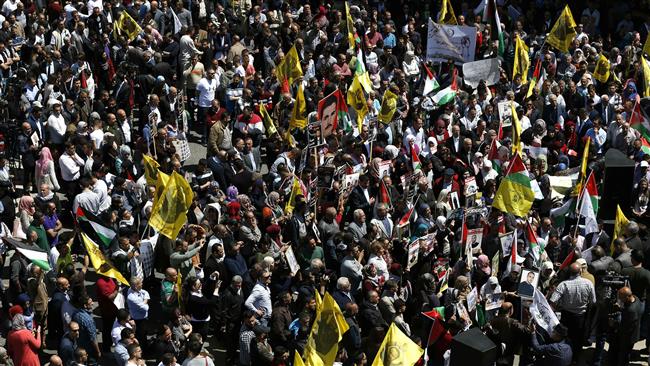
RNA - Unprecedented in scale, the protest action involves a reported number of 1,500 prisoners. It started on Monday to force Israeli prison authorities to provide more humane conditions for the inmates.
“We are obviously aware of the situation and following the developments closely,” UN spokesman Stephane Dujarric said on Tuesday. He said “as a matter of principle, wherever it may be, we always call for prisoners to be treated in a humane way.”
The protest leader, Marwan Barghouti, who has been given four life terms for allegedly masterminding anti-Israeli attacks, was placed in solitary confinement following the initiation of the strike.
The Israel Prisons Service spokesman Assaf Librati said Barghouti had been transferred from Hadarim Prison to the Kishon Prison, near Haifa.
The move came after he published an opinion piece in The New York Times on the hunger strike.
Israeli authorities have ruled out negotiating with the striking Palestinian prisoners.
Public Security Minister Gilad Erdan said the hunger strikers “are terrorists and incarcerated murderers who are getting what they deserve and we have no reason to negotiate with them.”
Palestinians have rallied in the occupied West Bank in support of the hunger strikers. The protests led to clashes with Israeli forces.
The UN official further said the world body takes cognizance of the confrontations and added, “We call on all parties to exercise maximum restraint.”
‘No surrender’
In The New York Times opinion peace, Barghouti vowed that Palestinians would not surrender in the face of Israel’s “inhumane” occupation.
“Decades of experience have proved that Israel's inhumane system of colonial and military occupation aims to break the spirit of prisoners and the nation to which they belong, by inflicting suffering on their bodies, separating them from their families and communities, using humiliating measures to compel subjugation,” Barghouti wrote. “In spite of such treatment, we will not surrender to it.”
In a show of solidarity with their loved ones, the families and relatives of the protesting inmates launched a hunger strike in the West Bank on Tuesday, the Palestinian Ma’an news agency reported.
They have erected a “solidarity tent” in the city of Salfit.
Ayman Muhammad Bani Nimra, the mother of an imprisoned Palestinian, told Ma’an that she had started refusing food and “would not stop unless our children in the (Israeli) occupation’s prisons end their hunger strike and receive improvements in the conditions of their detentions.”
Rimah Shawkat al-Khuffash, whose brother Haitham is also among the hunger strikers, urged all Palestinian citizens to support them, adding that she was also refusing to eat in solidarity with the prisoners.
Israeli prisons hold around 6,500 Palestinians, including 300 minors. Some of the inmates are held under Tel Aviv’s policy of administrative detention, which enables confinement without charge.
847/940